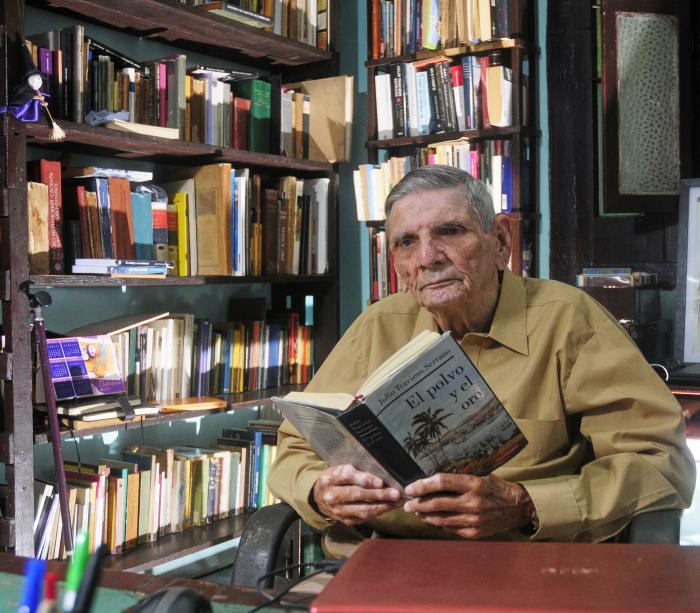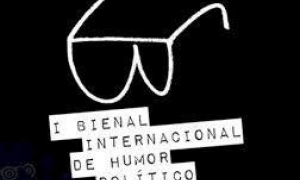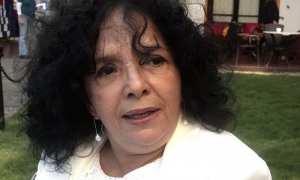
At the age of 82, storyteller Julio Travieso Serrano will have the 31st Havana International Book Fair dedicated to him. The good news came shortly after he was awarded the 2021 National Literature Prize, a well-deserved recognition.
Could it be that all good things come together, I ask him. "It's possible, I wish it were always like that. Over the years, we get lonely and become more sensitive. The treats are more appreciated," explains this author of around 16 books in which many, many stories have been told.
-Do you keep coming up with new ideas?
-I've written the most dissimilar stories: the history of Cuba over 200 years, life in Havana during the special period, the activity of Gnosticism from the first century to the present day.
"New ideas emerge. They come by different paths. Most come from personal situations and experiences. My book of short stories “Days of War” and my novel “To Kill the Wolf” are good examples. In them I poured what I went through during the struggle against Batista's dictatorship, in which I actively participated. In those works I wanted to bring out the demons (persecutions, tortures, assassinations of comrades), gathered in the form of memories, that I carried with me from that period. Other ideas come from what I was told or what I have read. In A New Day I gathered what nine people who assaulted the Moncada Barracks told me about those events. Besides, we have the rich source that is history, with its multiple chiaroscuros, which invite to unravel them using literature. I am preparing a book of short stories set in the COVID-19 pandemic in Havana.
-When do you consider that an experience is valuable to turn it into literature?
-When I come to the conclusion that I can catch the attention of the reader, give them pleasure, make them reflect and enrich their culture. To catch the attention of the reader is to ensure that they do not abandon what he is they are reading, that the book does not fall out of their hands. A book that bores is a failure, Borges told us. I am interested in provoking pleasure, which comes to us through a beautiful language, well cared for, and seeking reflection on what the reading proposes. If I consider that the idea I have in my hands allows the above, I begin to gather information and then I get into writing. The compilation can be arduous and long. With Dust and Gold I was looking for information from approximately 1984 to 1991. A work like The Book of Pegasus took me less than a year. The same happened with The nothebook of non-sense.
-On one occasion he told me that among his favorite works were Don Quixote and The Castle. And, among his poets, Antonio Machado. Regarding these preferences: Do you imagine the future of human spirituality without the reading of Don Quixote or without an approach to it?
-Reading, the knowledge of this or any other work, has to be induced, through persuasion and explanation. Teachers are fundamental in this, as they must show the beauty and depth of a text. Nobody forced me to read Don Quixote. It was explained to me, but I entered into it of my own free will.
Imagine the future of spirituality! I am not a philosopher, nor a prophet. I am a simple writer. If we want to be happy we should not concern ourselves with the future, according to Seneca, who wrote that the spirit to whom the future worries is always unhappy." I will only say that the loss of spirituality, the loss of the ideas of great writers and humanists would be terrible.
-Kafka left us works like The Castle. Are you a fan of this writer?
-Kafka is an author I have always been passionate about. It is impossible to talk about him in two lines. A Jew born in Prague, with a degree in law, who worked as a bureaucrat in an insurance company, he had an unspectacular life, not at all brilliant. He was sick with tuberculosis at the age of 34, he wandered through several sanatoriums and died in 1924, thus saving himself from the Nazi horror and from dying, like his three sisters, in a concentration camp.
In The Castle, someone arrives at a distant castle where he has been hired as a surveyor. He tries to contact his employer, but never succeeds; he can only communicate with secretaries who are secretaries of secretaries, in an endless and absurd chain. The first book of his I read, America, made a deep impression on me. Then I found others. Apparently everything in them is absurd, fantastic. If we observe well, it is not as fantastic as it is, Our world, dominated by a gigantic bureaucracy for which the common man means nothing, in which everyday life can be totally absurd, where nobody is surprised by anything anymore and nobody cares about what happens to the neighbor, a neighbor whose name we do not know. I am talking about the world in general, each country has its particularities. A world in which drugs have taken hold, changing humans, in which death awaits around the corner. For me Kafka is one of the greatest writers of all times.
-Machado, in optimistic verses, assures us that "Today is still always ". Are you enthusiastic? Are you optimistic?
-The reference to time is very frequent in Machado's poetry, especially in his early works. Am I enthusiastic? It depends. The word has several meanings, among others: exaltation and fervor of the spirit. Fervent adherence. Fury or rapture of the sibyls when giving their oracles. Divine inspiration of the prophets. Fiery and rapturous inspiration of the writer or artist, and especially of the poet or orator. I have never consulted the oracle of the sibyls, I am not a prophet, we must be careful with fervent adhesions and exaltation, which can lead to fanaticism and fundamentalism. I discard the meaning referring to the writer, because I have never had a fiery and rapturous inspiration. I would say that I am not an instant enthusiastic. I am if the moment and the fact that move me to enthusiasm deserve it.
Is it optimistic? The same thing happens to me as with enthusiasm. Above all, I am a realist, understanding realism as the way to present things as they are, without softening or exaggerating them.
-The Fair will reprint some of your books. Which ones? Will there be any novelty?
-Letras Cubanas publishing house will bring out a reprint of my novel Llueve sobre La Habana (rains in Havana), and Capiro publishing house will publish a new book, El amor a los cincuenta (love at fify), which gathers a selection of my previously published short stories. Sed de Belleza (thirst for beauty) publishing house will reprint El polvo y el oro (Dust and gold).
-Do you find the idea pleasant? How do you see your relationship with new readers who have not yet read your work?
-Of course, it is very pleasant. Young people, because of their age, come with a different vision and new tastes, very much influenced by the new communication technologies: reading a 500-page novel on paper or watching a Turkish soap opera on a cell phone? I would like them not to get bored with my reading and, even if they do not stop watching the soap opera, they read me.
- What to do so that so much "literate" humanity discovers a taste for reading?
-Offer them good literature that excites them, in which they see themselves reflected.
Translated by ESTI






